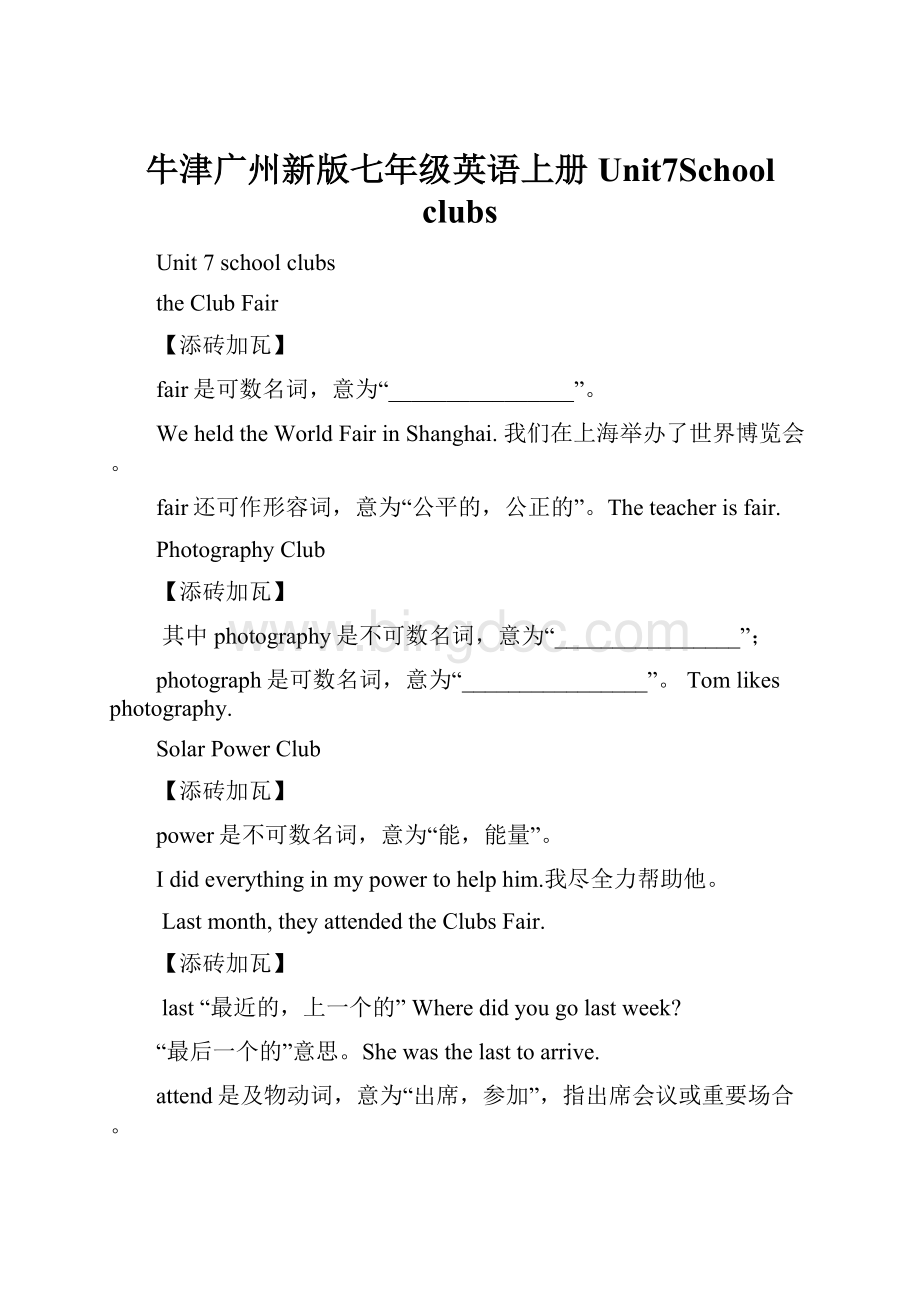牛津广州新版七年级英语上册Unit7School clubs.docx
《牛津广州新版七年级英语上册Unit7School clubs.docx》由会员分享,可在线阅读,更多相关《牛津广州新版七年级英语上册Unit7School clubs.docx(16页珍藏版)》请在冰点文库上搜索。

牛津广州新版七年级英语上册Unit7Schoolclubs
Unit7schoolclubs
theClubFair
【添砖加瓦】
fair是可数名词,意为“________________”。
WeheldtheWorldFairinShanghai.我们在上海举办了世界博览会。
fair还可作形容词,意为“公平的,公正的”。
Theteacherisfair.
PhotographyClub
【添砖加瓦】
其中photography是不可数名词,意为“________________”;
photograph是可数名词,意为“________________”。
Tomlikesphotography.
SolarPowerClub
【添砖加瓦】
power是不可数名词,意为“能,能量”。
Idideverythinginmypowertohelphim.我尽全力帮助他。
Lastmonth,theyattendedtheClubsFair.
【添砖加瓦】
last“最近的,上一个的”Wheredidyougolastweek?
“最后一个的”意思。
Shewasthelasttoarrive.
attend是及物动词,意为“出席,参加”,指出席会议或重要场合。
出席会议________________上课________________出席婚礼________________
辨析:
attend;join;joinin;takepartin
Attend:
意为“出席,参加(会议,讲座,婚礼,报告等)”
Ididn’tattendthemeeting.
Join:
意为“加入某个组织”,强调成为某个团体中的一员
joinaclub参加社团,jointhearmy参军,
Willyoujoinusfordinner?
请你和我们一起吃饭好吗?
Joinin:
意为“参加某项活动”(小型活动),尤其指和其他人一起参加某项活动
MayIjoininthegame?
我可以参加这个比赛吗?
Takepartin:
指参加群众性活动、会议、劳动、游行等(大型活动),往往指参加者持有积极的态度,起一份作用,有时与joinin可互换。
WillyoutakepartintheEnglishevening?
同我们一起参加英语晚会好吗?
【牛刀小试】
用attend;join;joinin;takepartin的正确形式填空。
1.Hewillneverforgetthedaywhenhe__________theParty.
2.Hisbrother__________thearmythreeyearsago.
3.Comeon,comeand__________theballgame.
4.Whydidn’tyou__________thetalklastnight?
5.Agreatnumberofstudents__________May4Movement.
6.DoUwantto__________mybirthdayparty?
7.Hedidn’t__________themeetinglastnight.
8.Iwill__________animportantweedingtomorrow.
Ourclubwillteachyouhowtobuildrockets.
【有章有法】
teachsb.sth.教某人某物/某事sb.是间接宾语sth.是直接宾语
howtodosth.是“疑问词+动词不定式”作宾语的用法。
【牛刀小试】
Canyoutellme________________________________(如何制作风筝)?
Pleaseshowme________________________________(如何画一匹马).
我不知道该去哪儿。
________________________________
她不知道下一步该做什么。
________________________________
Then“然后,其次”Thenyoucanlaunchthemintothesky.
【添砖加瓦】
作副词,还可表示“那么”;作名词,意为“那时(常作介词宾语)”
Thenwhydidyoudoit?
bythen到那时fromthenon从那以后tillthen到那时为止
Disappear不及物动词,意为“____________________”,
反义词是__________,“出现”。
Surprised;surprising;surprise
【火眼金睛】
surprised形容词,意为“对……感到惊奇”,句子的主语通常是人;
surprising形容词,意为“令人惊奇的”,主语通常是物;
surprise名词,意为“惊奇”。
besurprisedat对……感到惊奇
givesb.asurprise给某人一个惊喜
toone’ssurprise令某人吃惊的是
【牛刀小试】
He is very __________ to see Jay on the street.
The news is very __________.
To my__________ , he was a thief.
The result is __________ .
I was __________ to see him there.
Willitgoallthewayintospace?
【添砖加瓦】
into介词,意为“到……里面去”
alltheway意为“一路上,自始至终”
another形容词,意为“再一的,另一的,别的”
【火眼金睛】
another:
表示不确定数目中的“另一个”。
That’squiteanothermatter.那完全是另一回事。
theother:
表示两个人或两样事物中的“另一个”。
Bothmyunclesareabroad:
oneisinParisandtheotherisinNewYork.
【牛刀小试】
He has two daughters. One is a nurse, _________ is a worker.
I don’t like this one. Please show me _________.
This glass is broken. Get me _________ .
Ihavetwomarkers.Oneisred, _________isgreen.
shout动词,意为“喊叫”
【添砖加瓦】
shoutto是由于距离远,声音小而“高声喊叫”;Ishouttohertohelpme.
shoutat表示生气时对某人大喊大叫,态度不友好。
Don’tshoutatthatoldman.
take…from意为“从……中取出……”
Judytookapenfromherpencilcase.
Few;afew;little;alittle
【火眼金睛】
afew意为“几个,少数(还有几个,肯定意义)”,用来修饰可数名词复数。
few意为“几个,少数(几乎没有,否定意义)”,用来修饰可数名词复数。
区别:
little,alittle+不可数名词(有a则有,无a则无)
Thereareafewboysplayingontheplayground.
Therearefewboysplayingontheplayground.
【牛刀小试】
1.There is _______ water in the glass. Let's go and get some.
A. few B. afew C. alittle D. little
2. We still have _______ apples in the basket. You don’t have to buy any.
A. few B. a few C. little D. a little
3. I am new here. So I have _______friends here.
A. few B. a few C. little D. a little
4. The twins can speak only _______ French.
A. few B. a few C. little D. a little
5.Let's go and have a drink. We still have _______time before the train leaves.
A. few B. a few C. little D. a little
That’swonderful.
【添砖加瓦】
wonderful形容词,意为“神气的,绝妙的,极好的”
I’msureyou’llhaveawonderfultime.
It’swonderfultogoswimminginsummer.
match可数名词,意为“比赛,竞赛”。
【添砖加瓦】
举行比赛________________观看比赛________________在比赛中________________
下周我们要举行一场篮球赛。
________________________________________________
onTV意为“在电视上”。
但是“在广播里”“在电脑上”却要用the,表达为ontheradio,onthecomputer.
Whatdidyoudonext?
【添砖加瓦】
next副词,意为“其实,然后”,可置于句首、句中或句末。
Whenshallwemeetnext?
next可作形容词,意为“下一个的,接下来的”“隔壁的,(空间上)最近的”
nextdoor邻家;隔壁, nextroom隔壁房间
next名词,意为“下一个”theyearafternext后年 Next,please!
next介词,意为“在……旁”aseatnextherfire 炉子旁的座位
Itwasboring.
【添砖加瓦】
boring一般修饰物,意为“令人厌倦的,乏味的”
bored通常修饰人,意为“感到无聊的”。
Theboyfeelsvery_______.Thebookisvery_______.
IwassoexcitedthatIcouldnotsleep.
【添砖加瓦】
so……that意为“如此……以至于”,
Thelittlegirlissolovelythateveryonelovesher.
我弟弟如此小以至于无法照顾自己。
________________________________________________
这个女孩如此小以至于无法搬动这个箱子。
________________________________________________
hurry不及物动词,意为“赶紧,匆忙”
Hehurriedtogettoschoolafterbreakfast.
hurry名词,意为“急忙,仓促”inahurry
Sherantoschoolinahurry.
useful形容词,意为“有用的,有益的,有帮助的”,常在句中作表语或定语。
【添砖加瓦】
ThisisausefulbookforEnglishbeginners.
以-ful结尾的形容词的反义词多是相应的以-less结尾的形容词
useful—uselesshelpful—helplesscareful—careless
重要句型
1.Teachsbhowtodosth教某人如何做某事
2.主语+be动词+So+adj+that主语+实义动词+So+adv+that如此。
。
。
以至于
3.Finally,itwastimetogohome.
itis\wastimetodosth是做某事的时间了
跟踪练习:
爱丽丝教我们如何制作蛋糕。
Aliceuscakes.
我起床如此的迟以至于我上学迟到了.
IgetupIamlateforschool.
汤姆,该吃早饭了.
Tom,itistime
这食物太美味以至于我还想再吃一碗。
ThedishisIwantanotherbowl.
吉米跑得太快以至于我追不上他。
JimmyrunsIcannotcatchhim.
语音知识
规则动词词尾加-ed有三种读音:
1.在清辅音后读作[t]。
如:
asked, helped, watched, stopped
2.在浊辅音和元音后读作[d]。
如:
enjoyed, studied, moved, called
3.在t / d后读作[id]。
如:
wanted, needed
【牛刀小试】
()1.A.mendedB.invitedC.calledD.arrived
()2. A. closed B. listened C. excused D. watched
( )3. A. worried B. wanted C. loved D. stayed
( )4. A. worked B. defended C. stressed D. finished
( )5. A. hired B. planned C. tried D. defended
( )6. A. punished B. glared C. saved D. proved
Unit7SchoolclubsGrammar
一般过去时
一、概念
过去某个时间发生的动作或存在的状态,或者是过去习惯性、经常性的动作、行为。
其谓语部分用动词的过去式来表示,实义动词没有人称和数的变化,但be动词有单数was和复数were之分。
二、通常使用一般过去时的时间状语
如:
yesterday昨天、thedaybeforeyesterday前天、twodaysago…两天前…、theotherday前几天、lastnight(week、Sunday、weekend、month、winter、year、century世纪)、ago很久以前(一段时间+ago)、thismorning今天早上、justnow刚刚、atthemoment那时、attheageof8在8岁的时候、oneday、onceuponatime很久以前、intheolddays过去的日子里、longlongago很久以前
三、行为动词的一般过去式
行为动词是指表示具体动作的动词,如play,watch,eat等,它们的过去式表示这个动作发生在过去的某一时间。
Weplayedbasketballyesterday.
1、行为动词的过去式的构成:
可概括为“直、去、双、改”四字诀。
一般情况下在动词原形后直接加ed.如watched,played.
以不发音的字母e结尾的动词,去掉e再加ed. 如hoped,lived.
重读闭音节结尾且末尾只有一个辅音字母,即“辅+元+辅”(w和y除外),须双写最后一个辅音字母,再加ed. 如stopped,dragged,dropped,planned,chatted,kidded,begged,regretted,controlled,admitted,occurred,preferred,referred,permitted,equipped等.
注意:
quarrel,signal,travel中的l可双写(英国英语)也可不双写(美国英语)
注:
加现在分词时,需要留意以下两种情况。
1open它不是以重读闭音节结尾的,不符合上述条件,故末尾辅音不能双写。
而begin,forget是重读闭音节结尾的单词,符合上述情况,构成现在分词时,
需双写辅音beginning,forgetting。
②throw,play,stay虽符合"一元一辅"条件,但他们是元音字母组合发音不符合条件,故不能双写throwing,playingstaying
以“辅音字母+y”结尾的动词变y为i,再加ed.
如studied,worried.
有些动词的过去式变化是不规的,需单独记忆。
2、行为动词在一般过去时态的句子中的用法
肯定句要使用动词的过去式,否定句和疑问句要使用助动词do和does的过去式did. 谓语动词要用过去式时,行为动词的过去式没有人称和数的变化;改为否定句时,要把谓语动词改为“didn’t+动词原形”;改为一般疑问句时,在句首加助动词did,句中的动词要改为动词原形。
肯定句为:
主语+动词过去式+宾语
如:
Iwenthomeatnineo'clockyesterday.TheywatchedTVlastnight.
否定句:
主语+didn't+动词原形+宾语
如:
Ididn'tgohomeyesterday.Theydidn’twatchTVlastnight.
一般疑问句:
Did+主语+动词原形+宾语
如:
Didyougohomeyesterday?
DidtheywatchTVyesterday?
肯定回答:
Yes,Idid.Yes,theydid.
否定回答:
No,Ididn't.No,theydidn’t.
特殊疑问句:
特殊疑问词+一般疑问句Whendidtheygohome?
WhendidtheywatchTV?
四、be动词的一般过去时
1、be动词过去式的构成
be动词的过去式表示过去的状态,如是什么,在哪里,怎么样等。
Iwastwelvelastyear.
它与am,is,are一样,形式多样。
当主语是第一人称单数或第三人称单数时,谓语动词用was,主语是第二人称或其他人称复数时,谓语动词用were.即am,is的过去式是was;are的过去式是were.
2、be动词在一般过去时态的句子中的用法。
在肯定句中,be动词要用过去式was或were,在人称和数上与主语保持一致;改为否定句时,在was或were后直接加not;改为一般疑问句时,将was或were提到句首即可。
肯定句:
主语+was(were)+表语
如:
Iwaslateyesterday. TheywereinBeijinglastweek.
否定句:
主语+was(were)+not+表语
如:
Weweren'tlateyesterday.Theyweren’t/werenotinBeijinglastweek.
疑问句:
Was(Were)+主语+表语
如:
Wereyouillyesterday?
WeretheyinBeijinglastweek?
肯定回答:
Yes,Iwas.Yes,theywere.
否定句:
No,Iwasn't.No,theyweren’t.
特殊疑问句:
特殊疑问词+was(were)+主语+表语
如:
Whenwereyouborn?
Whereweretheylastweek?
五、助动词和情态动词过去式如下:
shall―should(将要)用于第一人称单数 will―would(将要)用于所有人称
can—could(能,会)may―might(可以)must―must(必须)haveto―hadto(不得不)
助动词和情态动词的过去时态要使用他们的过去式,后面的动词还使用原形。
如:
Ihadtodomyhomeworkyesterday.(昨天我不得不做作业。
)
六、一般过去式的主要用法
(1)一般过去时表示在过去某个时间发生的动作或存在的状态一般过去时不强调动
作对现在的影响,只说明过去的事情。
MyfatherworkedinShanghailastyear.Itwashotyesterday.
LeiFengwasagoodsoldier.注意:
在谈到已死去的人的情况时,多用过去时。
(2)也可以表示过去经常或反复发生的动作,常与always,often,never等连用。
Ioftenwenttoschoolonfoot. (过去)我经常步行去上学。
Mrs.Peteralwayscarriedanumbrella.彼得太太过去老是带着一把伞。
(只是说明她过去的动作,不表明她现在是否常带着伞。
)
比较 Mrs.Peteralwayscarriesanumbrella. 彼得太太老是带着伞。
(说明这是她的习惯,表明她现在仍然还习惯总带着一把伞)
Mrs.Peterisalwayscarryinganumbrella. 彼得太太总是带着一把伞。
(表示说话者对这一动作或行为厌烦)
Ineverdrankwine.我以前从不喝酒。
(不涉及到现在,不说明现在是否喝酒)
(3)与when等连词引导的状语从句连用。
Whenwegothome,wehadashortrest.Hewasreadingbookswhenhisfathercamein.
(4)如果强调已经终止的习惯时要用usedtodo(过去常常做,而现在不那样做了)
He